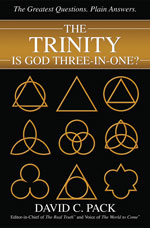This verse is often cited by those who claim that God’s Law is now void. The apostle Paul explained (Romans 10:3) how some in Rome were trying to establish their own righteousness apart from God. Ignoring Christ’s sacrifice, they thought that merely obeying the commandments would be sufficient for anyone to receive salvation.
Paul went on to explain in verses 6 and 7, “But the righteousness which is of faith speaks on this wise, Say not in your heart, Who shall ascend into heaven? (that is, to bring Christ down from above:) Or, Who shall descend into the deep? (that is, to bring up Christ again from the dead.)” In effect, Paul is saying, “Your righteousness is not going to change the fact that Christ died (no matter how righteous you are or think you are, Christ still had to die for your sins)” and “it is not going to change the fact that He is raised (and is now Himself living in converted Christians [Gal. 2:20; Rom. 8:9]).” It is Christ in us that enables us to keep God’s Law, not anything we do of and by ourselves.
To properly grasp the meaning of Romans 10:4, we must first understand what Paul meant by the phrase “the end of the law.” The Greek word translated “end” is telos (Strong’s #5056), meaning “the point aimed at; result.” In other words, Paul is saying that God’s spiritual Law, which God also calls “holy, and just, and good” (Rom. 7:12), points to Christ, who “[left] us an example, that you should follow His steps” (I Pet. 2:21). It is Christ living in us that enables us to keep God’s holy, perfect Law, which we lack the spiritual strength to keep, of and by ourselves (Rom. 7:14-25; 8:7-8). The Christian’s ultimate goal is to become like Christ, “the Author and Finisher of our faith” (Heb. 12:2).
In order to better understand the meaning of the word “end,” as used in the context of Romans 10:4, notice: “Behold, we count them happy which endure. You have heard of the patience of Job, and have seen the end of the Lord; that the Lord is very pitiful, and of tender mercy” (Jms. 5:11). James did not mean that Christ’s end had come. He meant that they (the scattered twelve tribes of Israel [1:1]) had seen the aim (purpose) of the Lord: “…that the Lord is very pitiful, and of tender mercy.” God’s tender mercy on mankind is shown in John 3:16: “For God so loved the world, that He gave His only begotten Son, that whosoever believes in Him should not perish, but have everlasting life.”


















